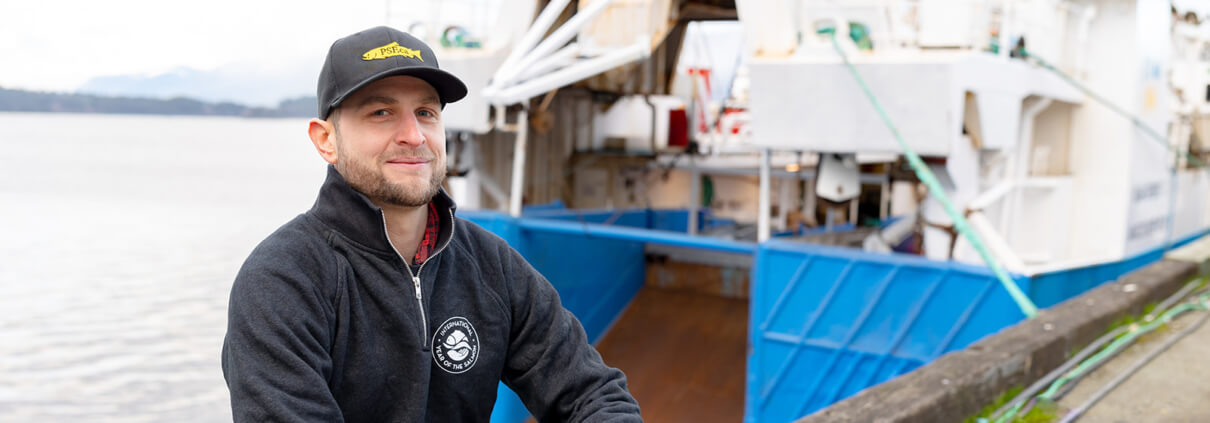Researcher provides data to solve Pacific salmon mystery
Clear details exist for freshwater habitats, but salmon life-cycle at sea remains murky—until now
February 22, 2022
Vancouver, B.C.—As Dr. Christoph Deeg, a researcher with the Pacific Salmon Foundation, sets foot on dry land briefly between two International Year of the Salmon High Seas expedition voyages, he brings back a host of clues to solve the mystery of life in the open ocean for salmon, illuminating the connection between climate-change-induced environmental conditions and disease in these iconic species. With nearly half of Pacific salmon populations in decline, it is imperative to understand open-ocean conditions to help mitigate further impact to several endangered species.
Although much is known about the factors that impact salmon survival in freshwater, Deeg’s research fills a gap in our understanding of salmon in the open ocean. As part of the 2022 International Year of the Salmon High Seas Expedition, Deeg’s current study follows up on research he conducted in 2019 and 2020 on previous expeditions in which he investigated pathogens and the combined impact of changing environmental conditions on the health of salmon in the Northern Pacific.
Two scientific journal articles publish this week feature his findings from the initial expedition. Together, the studies provide the first report on the health, condition, and infections of four Pacific salmon species in the Northeast Pacific during the winter. The research team found that warm temperatures and reduced prey availability were correlated with increased infection, highlighting the potential impact of future warming.
The attached research papers are embargoed until the dates below:
- Embargoed until February 24: “Way out there: Pathogens, health, and condition of overwintering salmon in the Gulf of Alaska” identifies two common parasites transmitted by salmon prey as key pathogens of all salmon species and suggests that they are transmitted in the open ocean. Further, salmon that were found in unusually warm waters showed signs of stress and had more infections. in FACETS—a multidisciplinary open-access journal published by Canadian Science Publishing.
- Embargoed until February 25: “In-field genetic stock identification of overwintering coho salmon in the Gulf of Alaska: Evaluation of Nanopore sequencing for remote real-time deployment,” published in Molecular Ecology Resources, describes a new application for the pocket-sized genetic sequencing “Nanopore” technology.
On the current expedition, Deeg’s research focuses on continuing the monitoring of salmon stress and pathogens as well as building on the previous successes of Environmental DNA (eDNA) surveys with improved sampling strategies and systems that allow to collect data continuously as the ship travels.
Dr. Christoph Deeg will be available to speak with media about his research:
Thursday February 24, from 3-5pm, PST
To schedule an interview, please contact:
ErinRose Handy|604-862-2706|ehandy@ psf.ca
Deeg’s International Year of Salmon research is funded by the North Pacific Anadromous Fish Commission (NPAFC). Affiliated with the University of British Columbia, Deeg’s research is funded by the Government of Canada’s Ministry of Fisheries and Oceans Canada’s BC Salmon Restoration and Innovation Fund (BCSRIF).
Dr. Deeg discusses his work in detail starting at 24:15 on this video.
About the Pacific Salmon Foundation
PSF is the independent, thoughtful leader and catalyst in conservation, restoration, and enhancement of Pacific salmon and their ecosystems through strategic partnerships and leveraged use of resources. www.psf.ca



